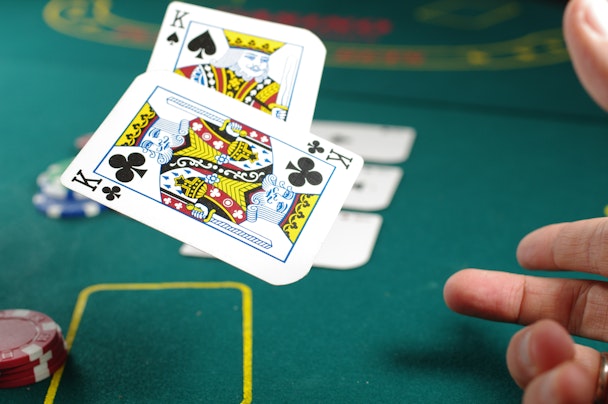What I learned… as a professional poker player, with Coegi’s Ryan Green
Ryan Green is vice-president of marketing and innovation at Missouri-based marketing agency Coegi. What you won’t necessarily see on his CV is that he spent most of his twenties as a professional (and successful) poker player. We sat down with him to find out what it’s like swapping chips for pitches.

Ryan Green of Coegi talks about his past life as a poker player / Michał Parzuchowski via Unsplash
Hi Ryan! We know you as a marketer, but I’ve heard you spent some time in a higher-stakes world?
I spent six and a half years as a professional poker player in my 20s. I dropped out of college after my bankroll was sufficient to play full-time. I was motivated by financial independence and being my own boss. What 21-year-old wouldn’t want that? It was very exciting and entrepreneurial in many ways.
Had you always been a poker player?
Poker was very natural and came easily to me in the beginning. I read a book given to me by a good friend who was successful, having made over a million dollars playing internet poker before he turned 21. I learned from observing him in his early years and understanding his thought process.
When internet poker became popular in the mid-2000s, there were a lot of bad players, so the games were soft and easy to beat. They became more difficult as the player pool became more competent. I had to do more and more studying to improve my game to keep the same profit margin.
Poker players have to become experts in reading people, not to mention strategy. What have you taken with you from the card table into the board room?
Poker is a great way to examine complex factors, which I go back to when trying to ground myself before making a major decision. It combines quantitative analysis alongside emotional, psychological disciplines.
At a poker table, there are 10 people you need to account for, just as there are many different parties to consider when thinking through marketing challenges. Each party will have different skill sets, motivations, mindsets and bargaining power when looking at the same hand or situation. This translates well to digital marketing, which requires looking at various KPIs to understand campaign results. The blending of quantitative and qualitative data is a useful lens for evaluating multivariate challenges.
It can’t hurt for negotiations...
Well, I don’t have to carry a poker face into most meetings anymore. The majority of the time, I’m looking for partnerships that benefit all parties, and no longer evaluate things as a zero-sum game. In marketing, we never want to be manipulative with customers, like in poker, but rather strive to be honest and forthright. I really only go back to the poker mindset to tap into that mental framework for important decisions.
One of the most important life lessons I learned through poker was how to deal with immense pressure at an early age. I still use the breathing and focusing techniques that I acquired back then before giving important presentations, for instance. Being able to get into the right competitive and focused mindset is a lifelong lesson I will continue to use.
How about the next generation of marketers – should they give poker a try if they get a chance?
Poker is a tough way to make a living. It requires you to be completely immersed to be the best; think of Beth in The Queen’s Gambit. You need to be the best to make it. You cannot simply be above average.
So I wouldn’t recommend this to most people in their 20s, but it can be a decent side hustle or a fun hobby. However, the study of the game does allow you to become detached from results and to evaluate complex decisions methodically, which can be beneficial for people who tend to make emotional decisions.
Poker trains you to eliminate biases (recency, negativity) and gives you a framework to make smarter, rational decisions under pressure. Poker is even used in some MBA programs to educate business students on this mental framework.
And what’s your advice for everyone else (those of us not blessed with the skills or constitution for high-level poker)?
My advice to someone wanting to start out in digital marketing is to first distinguish if you prefer to be a specialist or generalist. Do you like to have complete 360° understanding? If so, take entry-level internships and learn as much as you can in a broad space. On the flip side, if you like to dive deep into one or two disciplines, find what interests you the most and learn everything you can on those topics. With data science or programmatic in particular, this can be very valuable and both are in demand.
Content created with:

Coegi
Coegi is an independent digital agency providing services across digital strategy, media buying, paid social, search and influencer campaigns. We bring together...
Find out more
